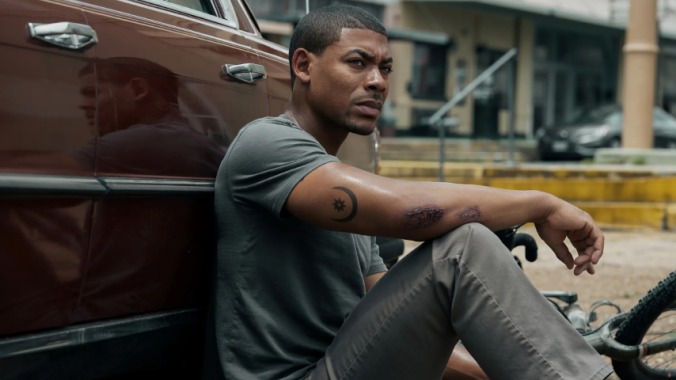Violence Haunts Every Moment of Jeremy Saulnier’s Thrilling Rebel Ridge

Not long after we first glimpse Terry Richmond (Aaron Pierre), huffing it on a mountain bike down a vaguely and deeply Alabamian road—Iron Maiden in his headphones blocking out every sound but his breath—he’s knocked to the ground. The impact is sudden and vicious, even with a cop cruiser just out of focus seconds before, looming and swerving behind Terry’s rear tire. That anxiety persists through the rest of Rebel Ridge like a low hum in the pit of one’s stomach. Violence waits impatiently, haunting every moment.
Terry’s on his way to post $10,000 bail for his cousin, held under a seemingly ludicrous amount of money for a possession misdemeanor, when his bike’s bumped from behind, spilling him onto the pavement. Sprawled out on his belly, Terry tries calmly to explain to the vaguely and deeply southern cop (David Denman), despite the taser pointed at him, that he couldn’t originally hear the car because of the music in his ears. Another shorter but proportionally more obstinate southern cop (Emory Cohen) arrives much too quickly to have been requested as backup. Terry knows where this is going; his firmly set jaw and glaring, fathomless eyes betray nothing but a man fully in control of himself, lest this situation gets out of control.
Regardless, just as suddenly as his bike was pushed out from under him, the situation upends. The cops find $36,000 in his backpack, a search they justify by claiming that Terry resembles a drug dealer on the loose, holding him cuffed in their cruiser because he apparently evaded the first cop’s attempts to pull him over. None of this is true, of course; we know nothing about Terry other than that, in contrast to the cops’ smug abuse and Terry’s superhuman politeness, we naturally believe him when he claims that $10,000 is for his cousin’s bail and the remaining $26,000 is for a truck they’ll buy so they can start hauling boats together (even showing the cops the advertisement for the used truck). Because, like Terry, we know where this is going. You don’t get to live in this country in 2024 and not know where this is going. Isn’t this what Civil War is about? Haven’t seen it.
But even Terry seems a bit surprised when the cops confiscate the money, describing the time-consuming, court-sanctioned venues Terry could pursue to get it all back, which they’re taking—all $36K—as part of the aforementioned drug-dealer-ish investigation. Terry’s pissed, of course, and maybe even showing signs of desperation at the corners of his pursed lips, because he needs to post bail before his cousin is transferred to a different prison, where his cousin will almost definitely be murdered for ratting out some former associates. He stays still. Released with a warning and no money, Terry bikes feverishly to the Shelby Springs courthouse, where law clerk Summer (AnnaSophia Robb) teaches him about the insidiousness of civil asset forfeiture and clues him into the obvious corruption running through the roots of this small, vaguely and deeply southern Alabama town.
Terry’s shitstorm with the Shelby Springs police only builds, of course. Writer/director Jeremy Saulnier’s films are never shy about abrupt savagery born from endlessly escalating suspense. Both Blue Ruin and Green Room assemble whole cosmologies of tension around the series of decisions that must be made by people totally unprepared for the graphic afterbirth of very simple violence. In Green Room, Pat (Anton Chekhov) and his poor touring punk band are so callously unready for the slaughter to greet them at a white supremacist bar in rural Oregon (go figure) that they cover Dead Kennedys’ “Nazi Punks Fuck Off” for a room full of skinheads. The nightmare that follows, involving attack dogs and disembowelment and several gruesome arm wounds, isn’t the direct result of their song choice, but punks aren’t known for self-preservation either.
-

-

-

-

-

-

-

-

-

-

-

-

-

-

-

-

-

-

-

-

-

-

-

-

-

-

-

-

-

-

-

-

-

-

-

-

-

-

-

-








































